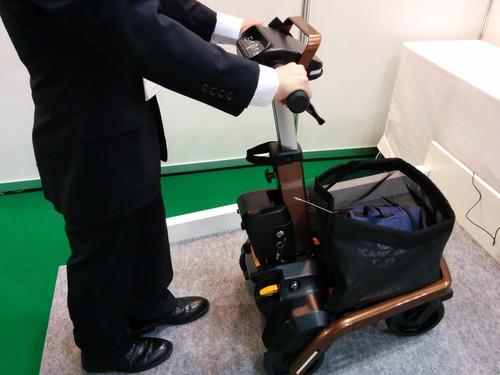
RT Works, a Japanese startup, shows off a connected robotic walker for elderly users at Japan Robot Week in Tokyo on Thursday.
If you're growing old in Japan, chances are you'll have some form of robotic help in the future.
The Japanese government is continuing to push robots and robotic services as a solution for the country's shrinking and aging population, 40 percent of which could be 65 or older by 2060.
Care for seniors is taking a prominent spot at the Japan Robot Week trade show in Tokyo, where Osaka startup RT Works has been showing off a prototype connected walker.
The Encore Smart looks a bit like a bulky shopping cart, but it has handlebars and brakes above its cargo basket. It has six-axis motion sensors that can automatically trigger motors to help push it up an incline or brakes to slow it down on a decline.
While that can come in handy on the hilly terrain that characterizes much of Japan, the walker's communication capabilities also can help caregivers monitor them. A GPS unit can relay location data via linked computers so caregivers can see where users are and how far they've walked on a given day. There's also a voice guidance function for getting around.
If the walker goes outside of a predefined zone, it will send an alert to caregivers via smartphone.
"That could be very useful if an elderly person wanders out near the seashore or a river," said RT Works CEO Sei Kohno. "The motorized functions of this walker can also help users walk farther without tiring, which helps them have a more independent lifestyle."
The startup hopes to launch the walker, whose price has yet to be determined, in Japan in June and eventually market the device in the U.S.
At a booth sponsored by Japan's Ministry of Economy, Trade and Industry, there are talking robotic dolls to keep elderly people company, devices that can automatically suction waste from bedridden patients and others that keep a watchful eye over patients with dementia.
One of the latter is a sensor unit called Owlsight from Tokyo startup Ideaquest. It's a long cylinder equipped with a camera and a Class 1 near-infrared laser that shines thousands of beams over the bed of a patient. Infrared sensors detect patients' movements and neural network algorithms can interpret whether they're sitting up, standing or getting out of bed.
If the system determines that a patient is leaving the bed or falling off, it alerts caregivers.
"My mother is in a nursing home and she tries to get out of bed and wander around," said Ideaquest spokesman Seishi Ohmori. "There's an alert mat next to the bed but I trigger it when I visit and someone comes running in."
Owlsight can also send a message to nurses when it detects that a patient's breathing has stopped, he said, adding that the company plans to install close to 100 systems in Japan by the end of the year in a trial supported by the government.
The ministry is also behind the latest strength-boosting device from Cyberdyne, a robotics startup that developed the HAL (Hybrid Assistive Limb) powered exoskeleton, which can be used by spinal-cord injury patients.
Weighing 3 kilograms, the HAL for Back Load Reduction is a power-assist device that hugs a user's lower back and thighs. It's designed to give caregivers a boost by reducing the load on their bodies when helping patients in and out of bed.
The device works through electrodes that pick up faint electrical signals on the skin's surface emitted when the brain instructs muscles to move.
"We're using robotics to help people in the nursing field who have lower back pain," said Cyberdyne's Tatsuro Muranaka, who was showing off the device alongside a video that showed users lifting a person out of bed.
However, the back-assist device will first be used by construction workers at major Japanese contractor Obayashi. Cyberdyne is renting out the devices for ¥120,000 (US$1,123) each per month.
Join the CIO Australia group on LinkedIn. The group is open to CIOs, IT Directors, COOs, CTOs and senior IT managers.
